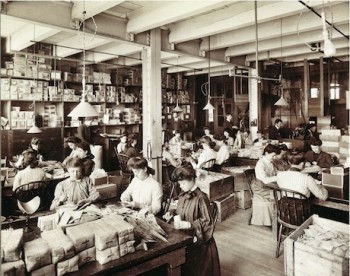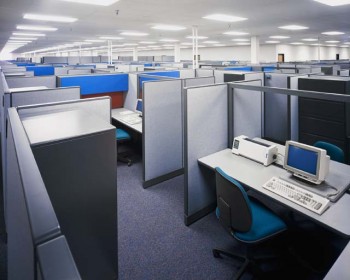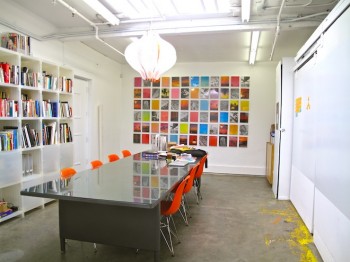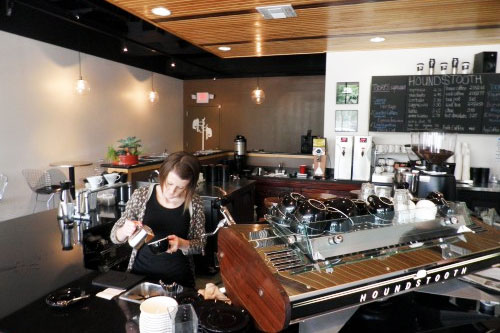
I’ve recently had the pleasure of being a part of many conversations about (un)employment, millennials, outsourcing, coworking, generation x, baby boomers, education, entrepreneurship, health care, corporations, and government. Bear with me, there’s a common thread here and I think it’s one that results in a revolution.
Article Highlights
Why We Work
Of late, a common discussion over dinner, or question in online communities, is why is entrepreneurship becoming more popular? The narrow view is that the dearth of technology startups and young entrepreneurs making headlines are a reflection of a new direction for our world – suddenly, everyone wants to be an entrepreneur! I’d offer that the question couldn’t be more misunderstood.
We live in a society where college is expected and a diploma demanded, so much so, that to do anything but, carries a stigma. And yet, school forces entrepreneurship out of us. Think I’m wrong? Consider what happens through education and then consider how, if everyone today needs to go to college, entrepreneurship can possibly be so hot.
Education doesn’t force the entrepreneur out of you on purpose necessarily, but out of necessity. Educational institutions must standardize (to some extent) in order to grade, credential, and qualify. Teachers can’t possibly teach to different skill levels and learning styles. They may disagree with me, and they certainly try, but it just can’t be done. I have kids in 2nd grade and I’m already frustrated not just for my kids but others who are either far ahead of the curve, behind the curve, or destined for something other than formal education dictates (artists, athletes, etc.). Heck, this is apparent when kids are in kindergarten and some kids can’t speak well while others are starting to read. Education can only serve a norm so those who are ahead get bored, those who are behind get attention, those who are creative are labeled, and everyone gets disillusioned.
From that early education, we move on to college with the belief that a diploma means a career and that a career means a job – working for someone else. The problem with that perception is that it isn’t true, it doesn’t work that way. People are then further disillusioned when they learn that their $100k diploma isn’t worth much more than a telemarketing job. In part, that’s due to a lack of experience but more so, that’s due to a lack of enough jobs to serve the number of people educated to be something more than a mail clerk.
Education teaches us to stop learning, stop innovating, and work for someone else. This is why we work, today. This is how we’ve been working, for the last 75 to 100 years.
The Dark Ages of Work
I like to think we’re hard wired to forge our own path and build things. Consider how you experienced life as a child, untainted by education and experience. You were an entrepreneur: you built with blocks, you played through your imagination, you drew pictures. This is how we want to work, isn’t it? Only as you get older do people turn instead to games, passive entertainment, and task based work – as we’re taught them.
Consider your economy (not to presume that you live in the U.S. where I live) 100 or 200 years ago. Everyone was an entrepreneur. I’d like to offer all of the talk about how entrepreneurship is this new exciting direction for our economy is misleading, entrepreneurship is in demand because people are fed up with the way we’ve been working for the last 75 years.
The Industrial Revolution
The first revolution in work that I’d like you to consider, effectively created economies in which we expect someone else to create opportunity for us; namely, corporations and government – they’ll take care of us, they’ll provide the jobs. Not without need for such a revolution, the industrial revolution changed the fact that 100+ years ago, people were tailors, inventors, farmers,

19th Century Coworking?
haberdashers, merchants, plumbers, bankers, doctors, lawyers, and carpenters… everyone was an entrepreneur who had to start their own business. Companies changed that.
Here’s the rub: Companies go out of business, downsize, and pivot – Governments are wasteful and stagnant. We first put our faith in those institutions to ensure work for everyone. In doing so, they started the dark ages.
Two things started to change alongside the industrial revolution.
We usually think about unions and production lines but I want to draw your attention toeducation and healthcare.
Before the industrial revolution, some went to trade schools, others learned through mentorships, but ultimately as Dennis Lyftogt of the Nashville Entrepreneur Center recently shared, everyone HAD to work in order to care for their families. If your farm was struggling, you tried something different or went to work on another one because healthcare didn’t exist and we had to pay our doctors bills directly. When you were out of work, health was a greater concern than income – you couldn’t afford to be sick.
The Technology Revolution
-

Working in cubes
Is there anyone who thinks this revolution from an industrial economy wasn’t just another version of our darkest times in employment?
60 years ago, going to college wasn’t considered the only way to go. 200 years ago, it wasn’t a way to go for most people. Those trade schools taught people how to make a living – as proprietors, as entrepreneurs. As the labor force moved away from entrepreneurship and into companies, the need arose to better qualify and credential people. First, as managers, executives, accountants, lawyers, and other professionals to serve that industrial economy. Education delivered, providing a more skilled workforce that in turn developed better businesses, larger companies, and innovative technology. The result was that entrepreneurship fell out of fashion as only the most educated, independent professionals (doctors, lawyers, and bankers) showed success the likes of which those companies could achieve.
As technology (starting around 1910) moved us from dusty factories to drab cubes, the demand for a service based labor force exploded and entrepreneurship all but died. Marketing, Sales, Business Development, Finance, and Operations professionals were the new vogue and schools delivered, pumping out business degrees faster than ever before imaginable. For a time, the technology revolution put the nail in the coffin of entrepreneurship as most resigned themselves to believing that the only way to go was a lifelong career with Westinghouse, Standard Oil, or International Business Machines.
These indeed were sad times…
But entrepreneurs emerge not where opportunity exists but where a gap needs to be filled. With so many educated professionals in the workforce, getting a college degree in business now means a two year job in telemarketing. ”You need to cut your teeth,” people told you. You have to get experience before you can get a real job. But wasn’t that indeed the point of a college education?
Put enough bright minds in a room, minds without a meaningful, fulling job and they create magic. Magic that started with Microsoft and the Apple personal computer and carried us through Yahoo, eBay, Amazon, Google, Facebook and more. These “entrepreneurs” were finding success in spite of the corporation… and many were doing it without the education that seemed so critical to success.
The Collaborative Work Revolution
Put bright minds in a room…
There was a hint of intent in my suggesting that our transition out of the dark ages is the result not of the success of a few entrepreneurs but their collaboration.
Coworking was born of a need for more formal space in which those individuals could collaborate. Out of coffee shops, emerged a few entrepreneurs who recognized the gap in work space and enabled for the their close network of peers a better way. But coworking was only one of many evolutions in the way we work – companies began outsourcing and support home based employees, technology advanced to serve our need to collaborate with teleconferencing, webinars, and services like Skype making the question of location irrelevant. Suddenly, we were collaborating everywhere and the collaborative work revolution enabled us to emerge from the dark ages and redesign the experience we have with work.
-
Have you recently taken a tour of the incredible places people are working these days?! Check out Weld in Dallas, Co+hoots in Phoenix, the American Underground in Durham, or Hive Haus in San Diego. Space is a reflection of our emergence from those drab times and work spaces these days are incredible.
You’re not still working in an office are you!?
We’re not just talking about entrepreneurs and freelancers benefiting from this revolution. Company employees aren’t just working from home, they’re turning to their employers to invest in their use of such incredible collaborative spaces as a way to network, innovate, and expand the impact they can have on a company as an individual resource. Brilliant minds in our industry are taking the impact these collaborative experiences are having on the way we work and bringing them into those companies that so substantially crushed our dreams. Jeff Sharpe and Nancy Giordano are changing the way companies plan and operate using collaborative design principles. Onward Search, a recruiting firm, and Ad People, a WPP ad agency, are exploring ways in which to connect with entrepreneurs and innovators through these collaborative experiences! The way we work isn’t just revolutionizing space, it’s revolutionizing the way in which we work with everyone else.
As a result, education too is changing. Trade schools, effectively, are starting to emerge again. We saw the need when I was building Cospace, and we’re seeing innovative community colleges and Universities striving to serve entrepreneurs and teach the skills that one needs to forge their own path rather than becoming a corporate drone. Our challenge, is that the stigma still exists that you have to go to college or you are somehow incomplete. The fear exists that if you don’t go to college, you can’t earn a tremendous living as an entrepreneur. It’s a tough transition to make but if we collaborate, if we support one another, we can start to embrace the downside of formal education, as well as the values it can bring to you as a person, and appreciate once again that how we played as children is a reflection of who we really want to be in work.




Great stuff Paul!
[…] it was that era from assembly line through gray cubicals that we might look back on as the “Dark Ages of Work.” People demanded better working conditions and unions emerged, wage disparities started to close […]